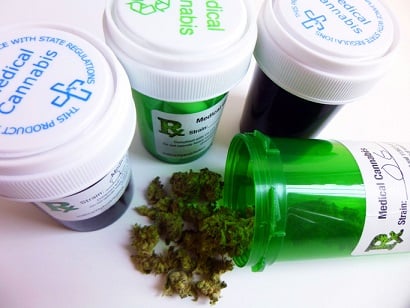Despite the decreased risks, coverage for less addictive herbal options is frequently denied

Insurers in Ontario like the Workplace Safety and Insurance Board (WSIB) are frequently denying requests from injured workers to be switched from opioids to medical marijuana.
Robert Vachon and Maurice Sagle, both suffering from injuries sustained from manual labour, received WSIB coverage for opioids for years, reported CBC News. But taking the drugs would lead to side effects like depression, decreased sociability, and a perceived slide toward addiction.
“The more you do, the more you want to do,” Sagle told CBC News. “"To me it was very dangerous stuff.”
After doing some research, both men separately tried out strains of cannabis that had low levels of THC, the substance that causes pot smokers to get high. They said their pain subsided, and they experienced none of the harmful symptoms they experienced with opioids.
With endorsements from their respective doctors, both men approached the WSIB and tried to get coverage for their cannabis treatments. But the board refused, saying they wouldn’t recognize the new weed-based treatment.
After years of back-and-forth communication and an endless stream of paperwork, Vachon said the WSIB is now covering his roughly $500 worth of monthly medical marijuana costs. Sagle, meanwhile, is still locked in an appeals process with the board, and is paying out-of-pocket for pot that he gets from a government-licensed producer.
“You often end up with these absurd scenarios where the WSIB is happy to pay for opiates and antidepressants that are not effective, that the worker does not want to take,” David Newberry, a lawyer with the Toronto-based Injured Workers Community Legal Clinic, said to CBC News. He added that marijuana is frequently cheaper than the array of opiates and other pharmaceuticals being prescribed to workers.
Part of the resistance comes from the Canadian Medical Association, whose vice president of professionalism Dr. Jeff Blackmer has said that the evidence supporting marijuana’s medical benefits “doesn't reach the quality that we demand for every other product that physicians prescribe.”
The current state of affairs, Newberry said, creates a class of workers who can access the medicine that’s right for them because they can afford it or can tap legal aid to fight a years-long battle for it, and another class of workers that are shut out.
“We are focused on limiting exposure to the harms associated with opioid use and lowering risk of addiction,” said Christine Arnott of WSIB Ontario, adding that the number of WSIB claims for opioids has dropped by 47%. “We treat requests for coverage of medical marijuana on a case-by-case basis. We will continue to help people manage their pain based on evidence, so they can safely return to work.”
Related stories:
Experts warn of pot’s potential health effects as legalization approaches
Canadian insurer introduces first guaranteed-issue policy covering medical pot



